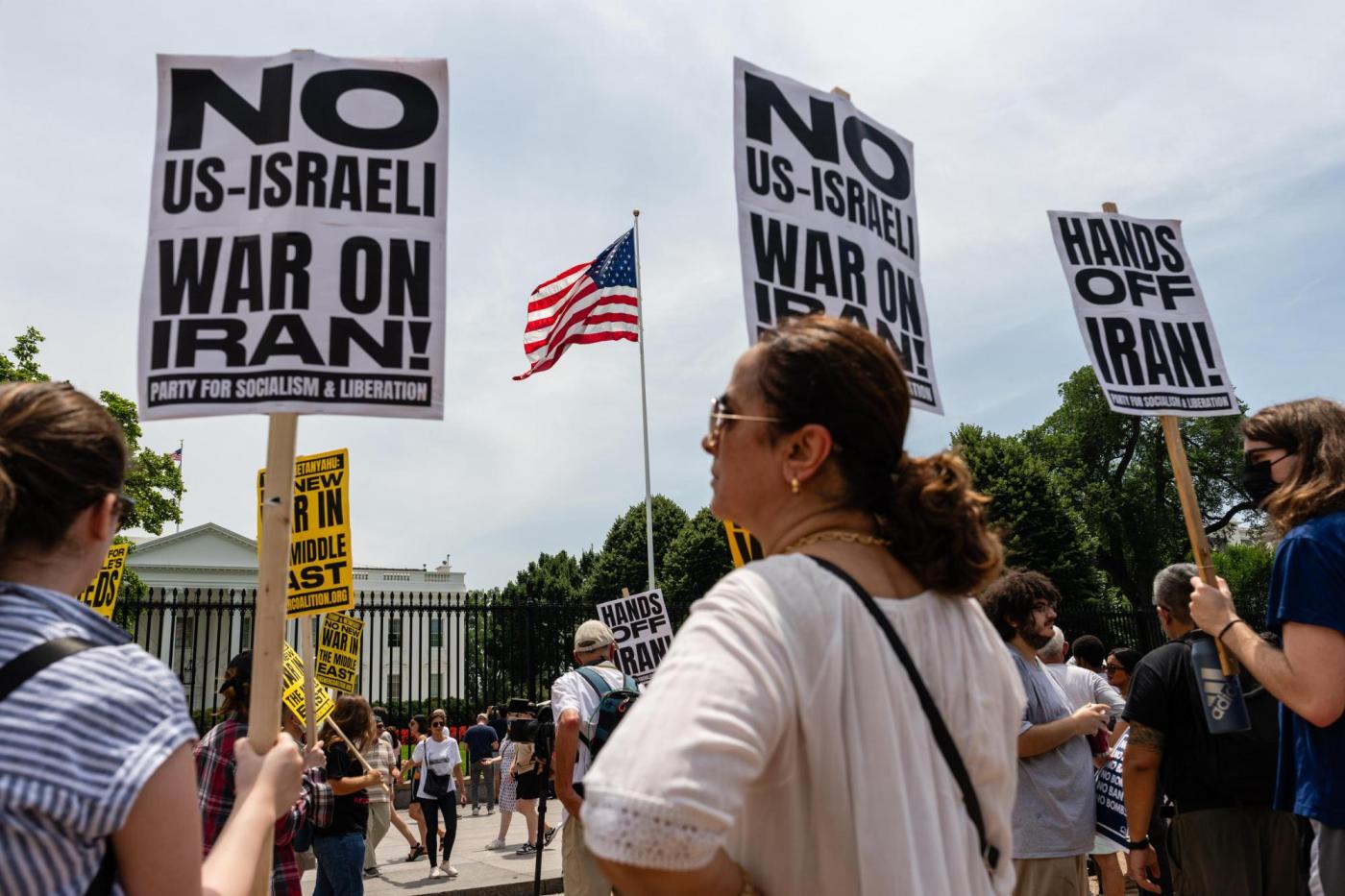WASHINGTON — Before he ordered strikes against Iran’s nuclear facilities, President Donald Trump did not seek permission from Congress, to which the U.S. Constitution grants the sole power to declare war. Many Democrats and even some Republicans say that the attack was tantamount to a declaration of war and that Trump acted illegally.
Related Articles
Letters: Trump’s attack on Iran makes Mideast less safe
Letters: Power to declare war rests with Congress alone
How badly have US strikes damaged Iran’s nuclear facilities? Here’s what to know
California sheriff’s department apologizes for ‘offensive and inappropriate social media post’ on Iran situation
The Latest: Supreme Court lets Trump restart deporting migrants away from their home countries
Several Trump aides say they disagree, calling the strike a limited action aimed solely at Iran’s nuclear capabilities that does not meet the definition of war. “This is not a war against Iran,” Secretary of State Marco Rubio told Fox News on Sunday.
Vice President JD Vance argued that Trump had “clear authority to act to prevent the proliferation of weapons of mass destruction.”
However, later Sunday, Trump wrote online that his military aims could be much more expansive: “If the current Iranian Regime is unable to MAKE IRAN GREAT AGAIN, why wouldn’t there be a Regime change??? MIGA!!!”
Criticisms of the attack, which came less than two weeks after Israel began its bombing campaign against Iran, include Trump not giving American policymakers, lawmakers and the public enough time to debate a role in a conflict that experts warn could expand quickly if Iran retaliates.
The furor over the sudden strikes follows years of bipartisan efforts in Congress to try to place greater limits on a president’s ability to order military action, efforts that arose because of disastrous American wars in the Middle East and Central Asia.
So is the United States at war with Iran? And did Trump have the authority to order his attack without consulting Congress?
What does the U.S. Constitution say about war?
Article I, Section 8 of the Constitution assigns Congress dozens of powers like collecting taxes and creating post offices, as well as the power to “declare war” and to “raise and support armies.”
The American framers considered that clause a crucial check on presidential power, according to an essay by the law professors Michael D. Ramsey and Stephen I. Vladeck for the National Constitution Center. Early in American history, Congress approved even limited conflicts, including frontier clashes with Native American tribes.
But the question is complicated by Article II of the Constitution, which delineates the powers of the president, and which designates the U.S. leader as the “commander in chief” of the U.S. military.
Presidents of both parties, relying heavily on legal opinions written by executive-branch lawyers, have cited that language to justify military action without congressional involvement.
What are members of Congress saying about the U.S. strikes?
Democrats have almost uniformly criticized Trump for acting without legislative consent, and a few Republicans have as well.
“His actions are a clear violation of our Constitution — ignoring the requirement that only the Congress has the authority to declare war,” Sen. Chris Van Hollen, D-Md., said in a statement echoed by many of his colleagues.
Rep. Thomas Massie, R-Ky., told CBS News that there was no “imminent threat to the United States” from Iran.
Sen. Tim Kaine, D-Va., said on the same CBS program that Congress must act this week to assert a role in any further U.S. military action.
“Would we think it was war if Iran bombed a U.S. nuclear facility? Of course we would,” Kaine said. “This is the U.S. jumping into a war of choice at Donald Trump’s urging, without any compelling national security interests for the United States to act in this way, particularly without a debate and vote in Congress.”
Some Democrats say Trump has already gone unforgivably far. Rep. Alexandria Ocasio-Cortez of New York called Saturday night for Trump’s impeachment.
Hawkish Republicans rejected such talk. “He had all the authority he needs under the Constitution,” Sen. Lindsey Graham of South Carolina told NBC News on Sunday. Graham cited Trump’s power as commander in chief under Article II of the Constitution.
“Congress can declare war, or cut off funding. We can’t be the commander in chief. You can’t have 535 commander-in-chiefs,” Graham said, referring to the combined number of U.S. representatives and senators. “If you don’t like what the president does in terms of war, you can cut off the funding.”
What are legal scholars saying?
Several lawyers and scholars who have studied the international law of armed conflict say the United States is without a doubt at war with Iran for purposes of application of that law, and that Trump acted in violation of international conventions.
“The short answer is that this is, in my view, illegal under both international law and U.S. domestic law,” said Oona Hathaway, a professor of international law at Yale Law School who has worked at the Defense Department.
Brian Finucane, a former lawyer at the State Department, agreed that Trump needed to ask Congress for authorization beforehand. He also said “there is certainly a U.S. armed conflict with Iran, so the law of war applies.”
On Sunday, Iran’s foreign minister, Abbas Araghchi, called the U.S. attack an “outrageous, grave and unprecedented violation” of international law and of the United Nations charter, which forbids U.N. members from violating the sovereignty of other members.
Araghchi did not specifically say that his country is now at war with America. Finucane also said the United States violated the U.N. charter.
Ryan Goodman, a law professor at New York University who has also worked at the Defense Department, said “one important matter for both domestic law and especially international law is the issue of ‘imminence.’”
The Trump administration is justifying the U.S. attack by saying Iran’s development of a nuclear weapon was imminent, Goodman noted.
But “the law would require that the attack would be imminent,” he said, and “it is very hard to see how the administration can meet that test under even the most charitable legal assessment.”
Even if one were to focus on the question of a nuclear bomb, U.S. intelligence agencies have assessed that Iran had not yet decided to make such a weapon, even though it had developed a large stockpile of the enriched uranium necessary for doing so.
How often have presidents sought congressional approval for war?
In the decades since Congress declared war on Japan and Germany in 1941, U.S. presidents have repeatedly joined or started major conflicts without congressional consent.
President Harry S. Truman sent U.S. forces into Korea. President Ronald Reagan ordered military action in Libya, Grenada and Lebanon; President George H.W. Bush invaded Panama; President Bill Clinton ordered the bombing of mostly Serbian targets in Yugoslavia during the Kosovo War; President Barack Obama joined a 2011 NATO bombing campaign against the government of Moammar Gadhafi in Libya and led a military campaign against the Islamic State group in Syria and Iraq.
Obama broke with this trend in September 2013 when he decided against launching a planned strike against Syria without first seeking congressional authorization. The strike was unpopular in Congress, which never held a vote, and Obama did not act.
President George W. Bush won separate congressional authorizations for the use of military force against Afghanistan and Iraq before ordering invasions of those countries in 2001 and 2003.
In the years since the al-Qaida attacks of Sept. 11, 2001, several presidents have also ordered countless airstrikes and special operations raids on foreign soil to kill accused terrorists. Those have largely relied on broad interpretations of the two authorizations for the use of military force that Congress granted the executive branch for the so-called war on terror.
Emma Ashford, a scholar of U.S. foreign policy at the Stimson Center, said that in the post-9/11 wars, “some presidents have largely stopped asking permission at all.”
In January 2020, Trump chose not to consult Congress before ordering an airstrike that killed a senior Iranian military commander, Gen. Qassem Soleimani, while he was visiting Iraq. Many members of Congress called that a clear act of war that was likely to begin wider hostilities. Iran responded by firing 27 missiles at U.S. forces in Iraq, inflicting traumatic brain injuries on about 100 U.S. troops. But the conflict did not expand further.
Last year, President Joe Biden ordered U.S. airstrikes against the Houthi militia in Yemen without getting congressional permission, and Trump did the same this year.
What happens next?
Republican leaders in the House and Senate have signaled support for the strike, but Democrats and a few Republicans are demanding that Congress approve any further military action.
Kaine, who serves on the committees on armed services and foreign relations, introduced a Senate resolution last week requiring that Trump get explicit congressional approval before taking military action against Iran. Kaine on Sunday said the measure was still relevant and that he hoped it would come to a vote this week.
Massie, the Kentucky Republican, introduced a similar war powers resolution last week in the House with Ro Khanna, D-Calif.
This article originally appeared in The New York Times.





